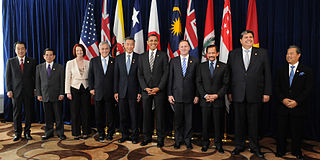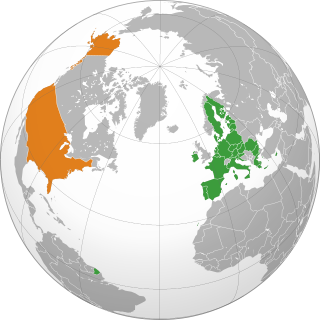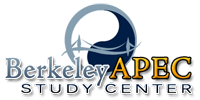
The Association of Southeast Asian Nations, commonly abbreviated as ASEAN, is a political and economic union of 10 states in Southeast Asia. Together, its member states represent a population of over 600 million and land area of over 4.5 million km2 (1.7 million sq mi). The bloc generated a purchasing power parity (PPP) gross domestic product (GDP) of around US$10.2 trillion in 2022, constituting approximately 6.5% of global GDP (PPP). ASEAN member states include some of the fastest growing economies in the world, and the institution occupies a central position in East Asian regionalism.

Asia-Pacific Economic Cooperation is an inter-governmental forum for 21 member economies in the Pacific Rim that promotes free trade throughout the Asia-Pacific region. Following the success of ASEAN's series of post-ministerial conferences launched in the mid-1980s, APEC started in 1989, in response to the growing interdependence of Asia-Pacific economies and the advent of regional trade blocs in other parts of the world; it aimed to establish new markets for agricultural products and raw materials beyond Europe. Headquartered in Singapore, APEC is recognized as one of the highest-level multilateral blocs and oldest forums in the Asia-Pacific region, and exerts significant global influence.
A preferential trade area is a trading bloc that gives preferential access to certain products from the participating countries. This is done by reducing tariffs but not by abolishing them completely. It is the first stage of economic integration.

The Trans-Pacific Partnership (TPP), or Trans-Pacific Partnership Agreement (TPPA), was a proposed trade agreement between 12 Pacific Rim economies: Australia, Brunei, Canada, Chile, Japan, Malaysia, Mexico, New Zealand, Peru, Singapore, Vietnam, and the United States. In the United States, the proposal was signed on 4 February 2016 but not ratified as a result of significant domestic political opposition. After taking office, the newly elected President Donald Trump formally withdrew the United States from TPP in January 2017, therefore ensuring the TPP could not be ratified as required and did not enter into force. The remaining countries negotiated a new trade agreement called Comprehensive and Progressive Agreement for Trans-Pacific Partnership, which incorporated most of the provisions of the TPP and which entered into force on 30 December 2018.
The East Asia Economic Caucus (EAEC) or East Asia Economic Group (EAEG) was a regional free trade zone (FTA) proposed in 1997 by Malaysian Prime Minister Mahathir Mohamad and encompasses most nations of East and Southeast Asia (ESEA). However, Japan at the time refused participation due to the exclusion of the United States, which at the time had tariffs on each other, has an economy too deeply interlinked through trade, and was still reeling from the effects of the Japanese asset price bubble. They also added that they were already members of the Asia-Pacific Economic Cooperation (APEC) and many other notable regional organizations in ESEA. South Korea was also extremely dissatisfied with the idea of placing Japan at the center of the proposed organization due to historical connotations.
The Pacific Trade and Development Conference (PAFTAD) is an informal private academic conference series that, since its origins in 1968, has developed into a driving force behind the development of thought on Pacific trade and development issues and important economic policy questions facing the region.
John Sullivan Wilson is a former Lead Economist (retired) of the World Bank. He directed and managed research on transparency, trade facilitation, regulation, and economic development. Mr. Wilson served in the Development Research Group of the World Bank and also in operations in the Infrastructure Vice Presidency.
Vinod K. Aggarwal is an American professor and holds the Alann P. Bedford Endowed Chair of Asian Studies in the Travers Department of Political Science. He is an Affiliated Professor in the Haas School of Business, and directs the Berkeley APEC Study Center (BASC). He is a visiting professor at INSEAD's Asia campus, a blogger for the Harvard Business Review, and has contributed to the New York Times. He also serves as Editor-in-Chief of the journal Business and Politics. Aggarwal is a frequent commentator and author about issues related to international political economy. He has appeared on the Korean television show Great Minds in 2021 and in 2023-24. In addition, he appears regularly on American television.
The University of California, Berkeley, contains many research centers and laboratories.

Peter David Drysdale is an Australian economist and writer. He is Emeritus Professor of Economics in the Crawford School of Public Policy in the College of Asia and the Pacific at the Australian National University. He was executive director of the Australia-Japan Research Centre (AJRC) until 2002.

APEC United States 2011 was a series of political meetings around the United States between the 21 member economies of the Asia-Pacific Economic Cooperation during 2011. It culminated in the 19th APEC Economic Leaders' Meeting held at the Hawaii Convention Center in Honolulu, Hawaii from November 12–13, 2011. The United States last hosted an APEC summit at the 1993 summit in Seattle. President Barack Obama, a Honolulu native, and First Lady Michelle Obama hosted the other leaders and spouses.

The Austrian Institute of Economic Research is a private non-profit association located in Vienna, Austria.

The Development Policy Centre (Devpol) is an aid and development policy think tank based at the Crawford School of Public Policy in the College of Asia and the Pacific at the Australian National University. Devpol undertakes independent research and promotes practical initiatives to improve the effectiveness of Australian aid, to support the development of Papua New Guinea and the Pacific Islands region, and to contribute to better global development policy.

The Transatlantic Trade and Investment Partnership (TTIP) was a proposed trade agreement between the European Union (EU) and the United States, with the aim of promoting trade and multilateral economic growth. According to Karel de Gucht, European Commissioner for Trade between 2010 and 2014, the TTIP would have been the largest bilateral trade initiative ever negotiated, not only because it would have involved the two largest economic areas in the world but also "because of its potential global reach in setting an example for future partners and agreements".

The Regional Comprehensive Economic Partnership is a free trade agreement among the Asia-Pacific countries of Australia, Brunei, Cambodia, China, Indonesia, Japan, South Korea, Laos, Malaysia, Myanmar, New Zealand, the Philippines, Singapore, Thailand, and Vietnam. The 15 member countries account for about 30% of the world's population and 30% of global GDP, making it the largest trade bloc in history. Signed in November 2020, RCEP is the first free trade agreement among the largest economies in Asia, including China, Indonesia, Japan, and South Korea.
The East Asian Bureau of Economic Research (EABER) is a forum for economic research and analysis of the major issues facing the economies of East Asia.

The European Union Centers of Excellence in the United States is a network of eight university programs dedicated to the promotion of the study of the European Union as well as the strengthening of ties between the people of the EU and the United States. The centres operate through teaching programs, as well as academic research and community outreach. Their development has allowed for the growth and improvement of EU studies in US higher education and made them a source of information for a far-reaching US audience.
Griffith Business School is part of Griffith University in South-East Queensland, Australia. It is a public university with more than 43,000 students circa 2015.

APEC Thailand 2003 was a series of political meetings held around Thailand between the 21 member economies of the Asia-Pacific Economic Cooperation during 2003. Various meetings were held across Thailand to discuss present economic conditions and future global policies. Leaders from all the member countries met from 20-21 October 2003 in Bangkok. President George W. Bush will attend leaders' meetings and will visit Indonesia, Japan, the Philippines, Singapore and Australia. The presentation defines the major issues that may arise during the APEC meeting and President Bush's visit to East Asia.













